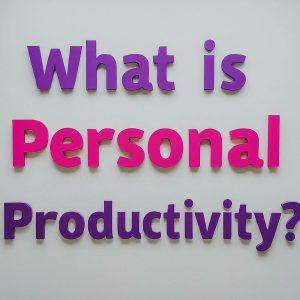Sarah loved mornings. It didn’t matter what side of the bed she woke up on. Once her alarm rang, she jumped out and hurriedly set out for her daily duties, pausing only to craft her daily to-do list. By noon, most of the tasks were almost always checked off. David, on the other hand, preferred the moonlit glow. His creativity at night, under the quiet hum of his computer, there’s nothing he can’t get done. Both Sarah and David considered themselves productive, yet their approaches were worlds apart. This, my friends, is the heart of personal productivity. So buckle up, grab your coffee (or kunu if you please), and get ready to unlock this productivity approach that can make all the difference.
What is Personal Productivity?

Forget the boring textbook definitions. Personal productivity isn’t about becoming a productivity robot. Instead, it’s about becoming the master of your time and energy. It’s about learning to say “no” to the distractions that pull you in a million directions and saying “yes” to the things that truly matter.
Now, before you roll your eyes and think, “Yeah, right, like that’s ever gonna happen,” let me assure you: personal productivity is achievable. It’s not a magic formula or a one-size-fits-all approach. It’s about understanding how you work best, hacking your brain, and building habits that transform you into a time-taming, goal-crushing machine (of humankind, of course).
Benefits of Personal Productivity
In a world overflowing with demands and distractions, cultivating personal productivity empowers you to reclaim control, channel your focus towards what truly matters, and ultimately, experience greater fulfilment in your life. Beyond that, personal productivity empowers you to:
- Achieve your goals: Whether it’s mastering a new skill, launching a dream project, or simply getting that cluttered room organized, personal productivity equips you to turn aspirations into reality.
- Reduce stress and anxiety: Feeling overwhelmed by tasks is paralyzing. By mastering your time and energy, you free yourself from the constant pressure of uncompleted tasks and enjoy a calmer, more peaceful mind.
- Boost self-confidence: Completing tasks efficiently and effectively builds self-belief and a sense of accomplishment. This newfound confidence spills over into other areas of your life, empowering you to tackle challenges with greater optimism.
- Enjoy more free time: When you’re productive, you spend less time floundering and more time doing what you truly love, whether it’s spending time with loved ones, pursuing hobbies, or simply relaxing and recharging.
Know Yourself, Grow Yourself
The journey to personal productivity starts with a crucial step: understanding yourself. You wouldn’t try to fit a square peg into a round hole, would you? The same applies to productivity strategies. Not every approach works for everybody (a common myth espoused by productivity coaches)
Just like Sarah, the morning lark, and David, the nocturnal owl, thrived in their unique ways, your ideal productivity approach awaits within your unique rhythm. But how do you uncover it?
-
Reflect on Your Energy Levels
- Track your energy: Pay attention to how your energy fluctuates throughout the day. Are you a morning person buzzing with ideas at dawn, or do you find your creative flow blossoming under the cover of darkness? Your personality and sleep chronotype can give you an idea of this. practically, you can keep a journal for a week, noting your energy levels hourly.
- Identify your peak times: When are you most focused and productive? Are you a “get it done before lunch” type, or do you excel in marathon evening sessions? Scheduling your demanding tasks around your peak times can dramatically improve your efficiency.
-
Analyze Your Work Habits
- Observe your workflow: Do you thrive on structured routines with clear to-do lists, or do you prefer a more flexible, spontaneous approach? Do you excel at multitasking, or do you need dedicated blocks of focused time for deep work?
- Experiment with different methods: Try various productivity techniques like the Pomodoro Technique (25-minute work intervals with short breaks) or the Eisenhower matrix (that helps to prioritise tasks based on importance and urgency) and see which ones resonate with you.
-
Consider Your Environment
- Identify your ideal workspace: Do you need complete silence to focus, or does background noise stimulate your creativity? Some thrive in clutter-free spaces, while others find inspiration in a touch of organized chaos. Experiment and find the environment that helps you feel most productive or organise the one you have so it does.
- Minimize distractions: Be honest about your biggest time-wasters. Social media, phone notifications, or even open browser tabs can derail your focus. Identify these distractions and implement strategies to minimize their impact.
-
Don’t Be Afraid to Experiment
- There’s no “one-size-fits-all”: What works for your colleague might leave you feeling drained. Embrace the journey of self-discovery. Experiment, tweak your approach, and see what resonates with you.
- Be flexible: Your ideal productivity style may not be static. As your life evolves, so might your needs. Be open to adapting your approach based on changing circumstances.
Remember, this journey of self-discovery is not a one-time event. It’s an ongoing process of exploration and refinement. Monitor your productivity and celebrate your achievements. Did you complete a challenging task? Did you master a new technique? Acknowledge your progress to stay motivated and build confidence in your unique approach.
Building a Personal Productivity System

Now that you know your preferred style, it’s time to build a personalised productivity system that reflects your unique needs and preferences. Here’s how:
- Identify your goals: What do you want to achieve? Break down large goals into smaller, actionable steps.
- Schedule strategically: Block out time for specific tasks based on your energy levels and productivity style.
- Minimize distractions: Identify your biggest time-wasters and create strategies to eliminate them (hello, social media farewell!).
- Embrace technology: Utilize tools and apps that streamline your workflow and automate repetitive tasks.
- Track your progress: Monitor your time usage and identify areas for improvement. Celebrate your successes, big and small!
Measuring your Productivity
Measuring your personal productivity isn’t about rigid metrics and comparing yourself to others. It’s about assessing your progress and celebrating your unique wins. Did you achieve your goals this week? Did you feel more in control of your time and energy? Did you carve out space for the things that truly matter to you? If you answered yes, then you’re on the right track. If not, do not despair.
Remember, personal productivity is a journey, not a destination. There will be bumps along the road, days when distractions win, and moments when your carefully crafted system is crumbling. Embrace the process, experiment, and adapt your system as needed.
Remember, it’s not about becoming a machine; it’s about becoming the best version of yourself, one productive step at a time.



5 thoughts on “A Practical Guide to Building Effective Personal Productivity Habits”
How can someone know is personal productivity
Hi Eunice.
That’s a tough one. But it begins with detailed self examination. When am i most energetic? When am i most tired? What motivates me and all of those kinds of questions. Then it continues with you arranging your schedule based on that and then reviewing how much you are able to achieve in line with your goals periodically.
It says to track my energy? Is there a difference between laziness and unproductivity.
Oh yes, there is a world of difference between them, Ololade. Laziness is often rooted in low motivation and a choice to not want to do anything. Not being productive on the other hand doesn’t mean you’re not making efforts. it only means you’re not achieving the results you should or you’re not working efficiently.
Let me know if this helps
Yes, thank you so much sir